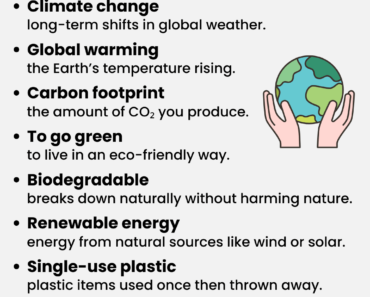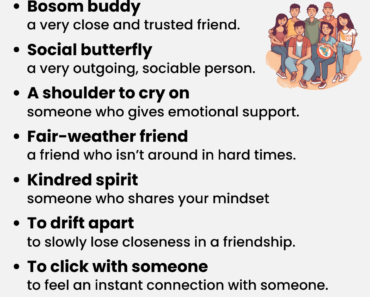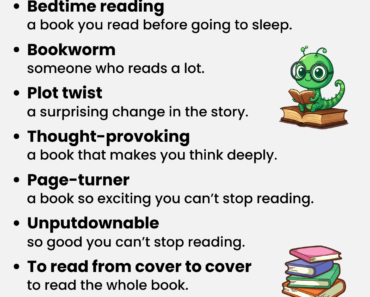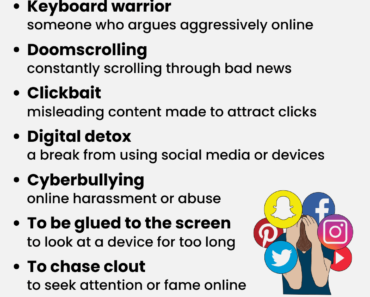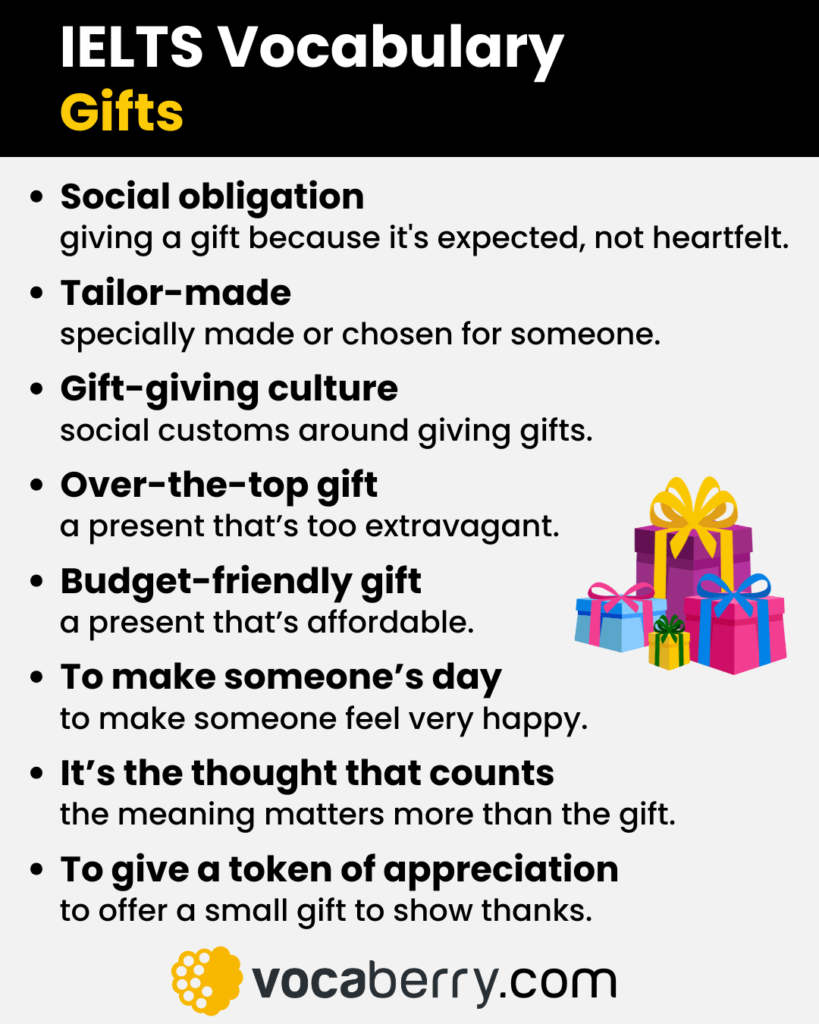
Gifts are a popular topic in the IELTS Speaking test. Examiners may ask you about gifts you’ve received or given, how you choose presents, how people celebrate special occasions, or what gift-giving means in different cultures. In this guide, you’ll learn useful IELTS vocabulary for gifts with clear definitions, followed by IELTS Speaking Part 1, Part 2, and Part 3 questions with sample answers.
IELTS Vocabulary for Gifts
Here is some useful IELTS vocabulary for talking about gifts with clear definitions. These words and phrases will help you give better answers in the IELTS Speaking test.
- Recipient – the person who receives a gift.
- To wrap a gift – to cover a present with decorative paper.
- To unwrap a gift – to open a present.
- To exchange gifts – to give and receive presents.
- Thoughtful gift – a meaningful and considerate present.
- Personalized gift – a gift made or chosen specially for someone.
- Practical gift – something useful that a person can use in daily life.
- Homemade gift – something made by hand, such as crafts or baked goods.
- Tailor-made – specially made or chosen for someone.
- Impersonal – lacking personal touch or emotion.
- Surprise gift – a present given without the receiver expecting it.
- Gift voucher / gift card – a prepaid card for buying what someone likes.
- Expensive gift – a costly or luxurious present.
- Inexpensive gift – a small or affordable present.
- Social obligation – giving a gift because it’s expected, not heartfelt
- Heartfelt – sincere and deeply felt.
- Heartfelt note – a message that is sincere and full of emotion.
- Meaningful – having emotional or personal significance.
- Conventional – traditional or not unusual.
- Tight-fisted – unwilling to spend money; stingy.
- Atrocious – extremely bad or unpleasant (e.g. an awful gift).
- Gift-giving culture – the social customs and values around giving gifts.
- Birthday present – a gift given on someone’s birthday.
- Wedding gift – a present given to a couple who just got married.
- Graduation gift – something given for academic success.
- Christmas gift – a present given during Christmas.
- New Year gift – a present given to start the year.
- Anniversary gift – a gift for a marriage or relationship milestone.
- Last-minute gift – a present chosen just before the event.
- Gift etiquette – polite behaviour around giving and receiving gifts.
- Over-the-top gift – a present that’s too extravagant or excessive.
- Budget-friendly gift – a present that’s affordable.
- Sentimental value – emotional importance a gift holds.
- Keepsake – a small item kept as a memory.
- Unwanted gift – a present that’s not useful or liked.
- Wrapped with care – packaged thoughtfully or nicely.
- Guilt gift – a present given to make up for a mistake or absence
- To pick out a gift – to choose a suitable present.
- To go for something – to choose or decide on something.
- To show appreciation – to express gratitude for a gift or gesture.
- To show affection – to express love or care.
- To surprise someone – to do something unexpected and pleasant.
- To return a gift – to give back a present, often if it’s not suitable.
- To regift something – to give a received gift to someone else.
- To express gratitude – to show thanks or appreciation.
- To pay a compliment – to say something nice to show admiration.
- To celebrate milestones – to recognize big life achievements.
- To celebrate an occasion – to enjoy or mark a special day.
- To host a party – to organise a celebration or event.
- To put thought into something – to carefully consider before giving a gift.
- To make someone’s day – to make someone feel very happy.
- To make a good impression – to create a positive feeling or image.
- To give a token of appreciation – to offer a small gift to show thanks.
- To mean the world to someone – to be extremely important to someone.
- It’s the thought that counts – the intention matters more than the gift itself.
IELTS Speaking: Gifts Questions & Answers
In this section, you’ll find IELTS Speaking Part 1, Part 2, and Part 3 questions on gifts with sample answers. These examples show how the gift-related vocabulary can be used in your responses during the test.
IELTS Speaking Part 1 – Gifts
Do you enjoy buying gifts for others?
Yes, I actually enjoy it a lot. I try to put thought into something that suits the recipient’s personality. Sometimes I go for a personalized gift, and other times I just pick a budget-friendly gift that’s still meaningful. I think it’s a nice way to show appreciation.
How do you usually choose a gift for someone?
It depends on the person and the occasion. I usually try to pick out a gift that’s either practical or has sentimental value. For close friends, I might get something tailor-made, while for others, a gift voucher works well so they can choose something they like.
How do you feel when you receive a gift?
It always makes me happy, even if it’s something small. What matters most to me is the thought behind it. You know, it’s the thought that counts. I once received a keepsake from a friend, and even though it wasn’t expensive, it really meant the world to me.
Do people in your country spend a lot of money on gifts?
Some do, especially during weddings or birthdays, where it’s common to give expensive gifts. But I feel like it’s becoming more balanced now. Many people prefer budget-friendly gifts or homemade gifts, especially when they want to avoid making it feel like a social obligation.
Have you ever received a gift you didn’t like?
Yes, once I got a tie that I would never wear. It felt very conventional and honestly a bit atrocious in terms of color. I knew it was a last-minute gift, so I didn’t take it personally. I just smiled and said thank you, because again, it’s the thought that counts.
IELTS Speaking Part 2 – Gifts Cue Card
Describe a gift you gave to someone.
You should say:
- What the gift was
- Who you gave it to
- Why you gave it
- And explain how the person reacted.
Sample Answer:
One of the most memorable gifts I’ve ever given was a personalized gift for my best friend’s birthday. Instead of buying a conventional present, I decided to create something more special. I made a tailor-made scrapbook filled with our old photos, funny quotes, and little memories we shared. I also wrote a heartfelt note on the first page to express how much our friendship means to me.
I spent quite a bit of time preparing it because I wanted it to carry real sentimental value, not just feel like a social obligation. I could have gone for a gift voucher or an inexpensive gift, but I really wanted it to be unique. I wrapped it with care using kraft paper and a ribbon, and I even added a tiny token of appreciation on top, which was a handmade keychain with her initials.
I gave it to her during a small birthday party we hosted at her house. When she unwrapped the gift, she was genuinely surprised. She said she hadn’t expected such a thoughtful gift, and she actually got emotional reading the note. She told me it completely made her day and called it the most meaningful gift she’d ever received.
For me, the best part was seeing her reaction. It reminded me that it’s the thought that counts, not the price tag. I believe a sincere and heartfelt gesture can mean far more than an over-the-top gift. That’s why I always try to put thought into something and choose gifts that reflect how I feel about the recipient. Moments like that really strengthen relationships.
IELTS Speaking Part 3 – Gifts Discussion
IELTS Speaking Part 3 questions about gifts often ask you to compare different types of presents, discuss cultural differences in gift-giving, and give opinions on the purpose of giving gifts or the value of handmade vs. store-bought items.
How do people usually choose a suitable gift?
Most people try to put thought into choosing a gift by considering the recipient’s personality, needs, or interests. A personalized gift or something tailor-made often feels more meaningful than something generic. For example, someone might give a homemade gift that carries sentimental value, rather than buying a typical gift voucher. Even an inexpensive gift can be special if it reflects genuine effort. I think the most appreciated gifts are those that feel intentional, not just bought out of convenience. Choosing well shows that you genuinely care and understand the person.
Do you think modern gift-giving is becoming too materialistic?
To some extent, yes. Nowadays, people are often drawn to expensive or over-the-top gifts, especially during major events like weddings or birthdays. Social media has played a role in this, encouraging people to show off extravagant presents. However, I believe that true value lies in the meaning behind the gift. A budget-friendly gift that carries emotional or personal significance can leave a lasting impact. Unfortunately, when people give just to impress, it loses authenticity and starts to feel like a social obligation. Personally, I think it’s better to focus on genuine intention, because in the end, it’s the thought that counts.
Why do some people find it difficult to choose gifts?
Some people struggle with choosing gifts because they’re unsure of the recipient’s preferences or worry their choice won’t be appreciated. Others may overthink it, trying too hard to find something unique or meaningful. Budget can also be a concern, especially for those who want to avoid seeming tight-fisted but still need to find a budget-friendly gift. Then there’s the fear of picking something unwanted, which might make the recipient feel awkward. That’s why many people choose safe options like a gift voucher or rely on conventional gifts. But in the end, I believe it’s the thought that truly matters.
How do people’s attitudes toward gift-giving change as they get older?
As people grow older, their approach to gift-giving often becomes more thoughtful and intentional. While younger individuals might focus on flashy or over-the-top gifts, adults tend to value meaning over price. They may start giving more practical gifts, or even things with sentimental value, like a keepsake or something homemade. Older people also become more aware of gift etiquette and the feelings of the recipient, aiming to give something that’s truly appreciated. In many cases, they might also see gift-giving as a way to strengthen bonds, not just follow tradition or fulfill a social obligation.
More IELTS Vocabulary Topics
If you found this lesson useful, explore other IELTS Speaking topics to expand your vocabulary and practice with sample answers:
- IELTS Vocabulary: Accommodation
- IELTS Vocabulary: Advertisement
- IELTS Vocabulary: Animals
- IELTS Vocabulary: Art
- IELTS Vocabulary: Artificial Intelligence
- IELTS Vocabulary: Books
- IELTS Vocabulary: Childhood
- IELTS Vocabulary: Crime and Punishment
- IELTS Vocabulary: Culture and Traditions
- IELTS Vocabulary: Daily Routine
- IELTS Vocabulary: Education
- IELTS Vocabulary: Environment
- IELTS Vocabulary: Family
- IELTS Vocabulary: Fashion and Clothes
- IELTS Vocabulary: Films
- IELTS Vocabulary: Food & Diet
- IELTS Vocabulary: Friends
- IELTS Vocabulary: Health
- IELTS Vocabulary: Hobbies
- IELTS Vocabulary: Hometown
- IELTS Vocabulary: Money
- IELTS Vocabulary: Museums
- IELTS Vocabulary: Music
- IELTS Vocabulary: Plants
- IELTS Vocabulary: Shopping
- IELTS Vocabulary: Social Media
- IELTS Vocabulary: Sports
- IELTS Vocabulary: Technology
- IELTS Vocabulary: Transport
- IELTS Vocabulary: Travel
- IELTS Vocabulary: Weather
- IELTS Vocabulary: Work & Jobs


